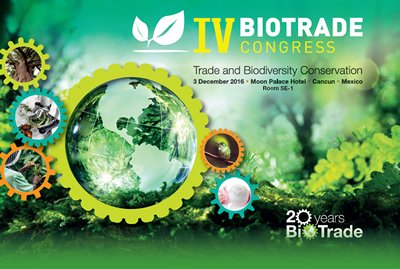Biodiversity conservation is not exclusively an environmental issue. Trade can be a positive incentive for the conservation of biodiversity, and trade policy can help countries achieving environmental objectives. However, it is important that the trade regime enhances its approach when recording and valuing biodiversity.
As noted by Lucas Assunçao, Head of Trade and Environment at UNCTAD, "we can not value what we cannot measure, particularly in trade policy". And BioTrade has proved an approach that governments, companies and other actors can use to translate international policy objectives into practice that favours the planet.
For instance, "BioTrade has assisted Switzerland in fulfilling its own biodiversity commitments under Aichi, as well as by providing essential services for human and economic wellbeing" said H.E. Marc Chardonnens, Swiss State Secretary, Federal Office for the Environment.
Since its launch by UNCTAD in 1996, the BioTrade Initiative has been promoting sustainable trade and investment in biodiversity to support of the objectives of the Convention on Biological Diversity(CBD).
"Our longstanding partnership with the BioTrade Initiative has been vital for advancing conservation and sustainable use in trade of products and services derived from biodiversity," noted David Cooper, CBD Deputy Executive Secretary. BioTrade has developed innovative collaborations with many stakeholders for over 20 years, currently benefiting around 5 million people in a variety of economic sectors in Africa, Asia and Latin America.
During the IV BioTrade Congress, Vietnam shared its approaches and experiences in using BioTrade, access and benefit sharing (ABS) and other related policies to mainstream biodiversity.
Peru exemplified the positive collaboration of the trade and environment ministries to enable access to international market for native species under BioTrade. The opportunities and challenges for private sector engagement in innovation, entrepreneurship, financing and ethical sourcing of biodiversity was also debated during the Congress.
Private sector representatives from around the world, discussed the prospects raised by BioTrade, including compliance with good practices, improved management systems, opportunities for certification and access to tools and guidance.
Based on discussions, the next 20 years of BioTrade look promising. Trade in biological resources currently constitutes 20 per cent of global trade. An estimated 19 per cent annual growth is foreseen for biodiversity goods and services with BioTrade potential until 2020.
By bringing stakeholders together, supporting enabling policy frameworks and strengthening technical and financial capacities of actors to sustainably use and trade biodiversity-based products and services, the importance of BioTrade is only increasing.
The IV BioTrade Congress was organized on 3 December 2016 with the support of the Swiss State Secretariat for Economic Affairs SECO in the context of the UN Biodiversity Conference in Cancun, Mexico, and celebrated 20 years of BioTrade.
Congress panelists included small and medium enterprises such as BioProcol (Colombia) and Mexialoe Laboratorios (Mexico), community-based associations such as the Eudafano Women´s Co-operative (Namibia), international companies such as Natura Cosmetics, Weleda and Groupe Rocher, and associations of companies such as the Union for Ethical BioTrade (UEBT) and PhytoTrade Africa.



